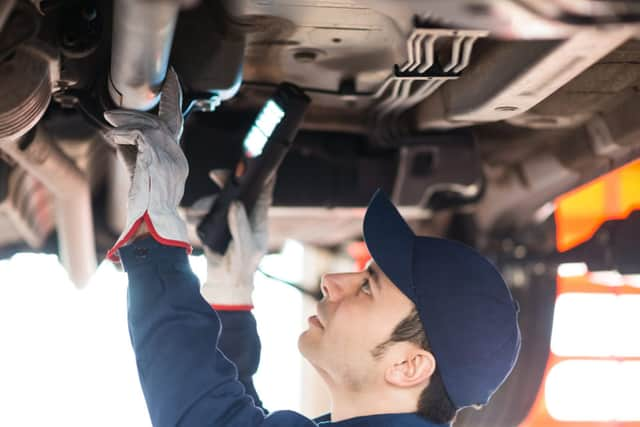Are MOT checks changing to every 2 years? Why annual MOT could be scrapped and would it be dangerous?
and live on Freeview channel 276
Vehicles may only need an MOT test every two years under rumoured Government plans.
According to sources from within the Cabinet, Transport Minister Grant Shapps has proposed the switch to help ease financial pressure on motorists.
Advertisement
Hide AdAdvertisement
Hide AdThe idea reportedly came out at a Cabinet meeting to discuss ways to address the growing cost of living crisis affecting families around the country.
At the moment, all vehicles between three and 40 years of age have to undergo an annual MOT test to assess their roadworthiness.


For cars and smaller vans, this test costs £54.85 and if testers identify any faults which are deemed “major” or “dangerous” then the vehicle will be refused its MOT. The owner will then have to have the issues fixed before using the vehicle on the road again.
Under the rumoured change, MOTs would be valid for 24 months instead of the current 12 months, which it is claimed would save drivers money. However, industry observers have questioned how much the move would actually save drivers and raised fears over the safety impact of extending MOTs.
Would it save drivers money?
Advertisement
Hide AdAdvertisement
Hide AdThe rumoured change is being presented as a way to ease financial pressure on drivers as the cost of living soars.
Switching to a two-yearly pattern would save drivers around £27 annually. as they only face the £54.85 cost of the test every second year.
However, observers have suggested it could cost them more in the long run as it could mean minor issues aren’t spotted as soon and are more likely to develop into larger, more expensive problems.
The AA’s head of roads policy, Jack Cousens, said: “Though well intended, moving the yearly spend on an MOT to every two years could make costs worse for drivers with higher repair bills.
Advertisement
Hide AdAdvertisement
Hide Ad“Rather than fiddling at the edges, drivers would rather see pump price transparency to revive competition on the forecourts or expanding park and ride schemes so drivers can avoid higher inner-city driving costs.”
Is a two-year MOT dangerous?
Motoring experts have been quick to question the safety implications of such a change, with fears that extending the gap between MOT tests could lead to more dangerous vehicles being left on the road for longer.
The RAC said it could make roads less safe, while the head of the Independent Garage Association (IGA) called the idea “dangerous, unwanted and unreasonable”.
In 2021 almost a third of cars and vans failed their MOT at the first attempt. Figures from the Driver and Vehicle Standards Agency show that on first presentation for a Class 4 MOT - which covers cars and smaller vans - 29.5% failed. After remedial work, this fell to a final failure rate of 23.2%.
Advertisement
Hide AdAdvertisement
Hide AdOf those, 8% - equivalent to 2,476,415 - failed on at least one “dangerous” fault.
If the gap between tests is extended and drivers don’t take responsibility for maintaining their vehicles, more cars could be left running with potentially dangerous issues.
The RAC’s head of policy Nicholas Lyes said: “The purpose of an MOT is to ensure vehicles meet a basic level of safety for driving on our roads. Shifting it from annually to every two years would see a dramatic increase in the number of unroadworthy vehicles and could make our roads far less safe.”
Stuart James, chief executive of the Independent Garage Association, told Car Dealer Magazine: “In times of economic hardship, it’s known that drivers cut back on servicing their cars and it’s the annual MOT that has kept the UK’s road safety at high levels thanks to the vital safety checks it carries out.
“In our opinion this whole plan is dangerous, unwanted and unreasonable.”
Mr Cousens also warned that scrapping the annual MOT could put jobs at risk across the garage and car maintenance industry.
Comment Guidelines
National World encourages reader discussion on our stories. User feedback, insights and back-and-forth exchanges add a rich layer of context to reporting. Please review our Community Guidelines before commenting.
